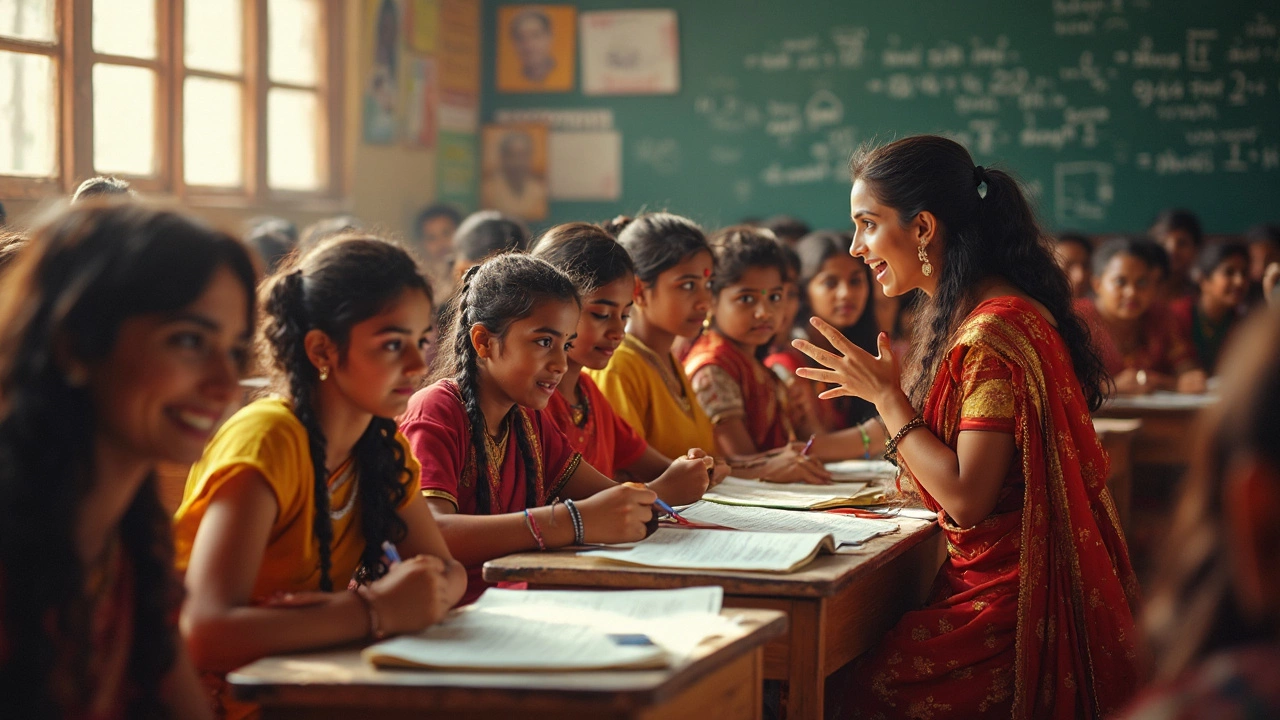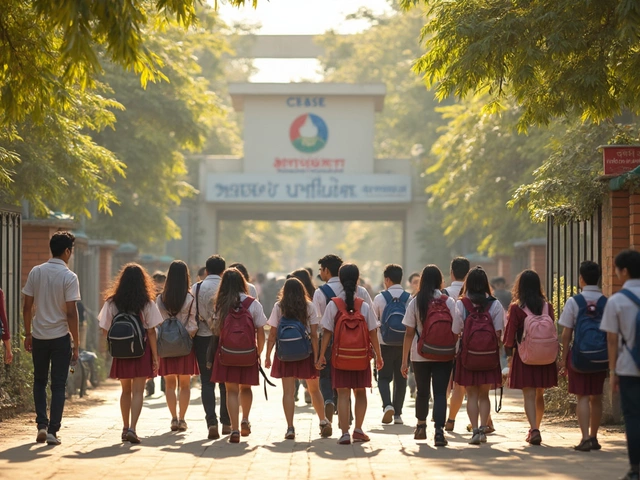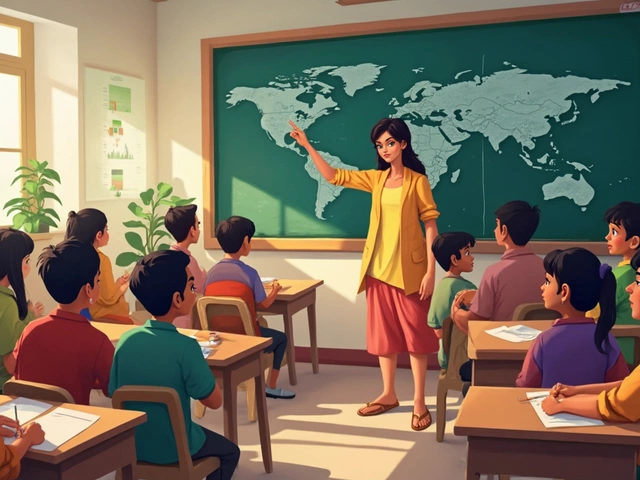Everybody knows exams can feel like a mental marathon, but have you ever stopped to ask which school syllabus actually deserves the title of "hardest in the world"? Students across the globe often argue about this, comparing what they study with what their friends in other countries face. Spoiler: It’s not a cut-and-dried answer, especially once you throw CBSE into the mix.
The CBSE syllabus has a serious reputation, not just in India, but worldwide—mainly because it goes deep into subjects and puts heavy marks on crucial board exams. But it’s not alone. Curriculums like the International Baccalaureate (IB) and the British A-Levels also have students burning the midnight oil. What exactly puts CBSE on the shortlist of toughest school syllabuses, though? Is it the content, the teaching style, the exam pattern, or just the pressure cooker environment?
If you’re a student or a parent feeling the heat right now, you’re definitely not imagining things. The worldwide race for top grades and college spots has made school more competitive than ever. Understanding what makes each syllabus challenging is the first step to figuring out how to work smarter, not just harder. Let’s get into what really sets these systems apart and whether being in the "hardest syllabus" is actually a badge of honor—or just extra stress on young shoulders.
- The Big Global Syllabus Face-Off
- Inside the CBSE: What Makes It Stand Out
- How CBSE Compares to IB and A-Levels
- Pressure Points: Student Life and Stress
- Tips to Tackle the Toughest Syllabuses
- Does the Hardest Syllabus Really Matter?
The Big Global Syllabus Face-Off
The battle for the hardest school syllabus title gets real when you look at how different systems stack up worldwide. The front-runners almost always include CBSE from India, IB (International Baccalaureate), A-Levels (UK), and sometimes China's Gaokao, which is actually their national university entrance exam but often compared for its brutal difficulty. Each one brings a different style to the table, and for students, that difference can mean hours more (or less) of work every week.
Here's a quick look at some of the most talked-about syllabuses:
- CBSE (Central Board of Secondary Education): Follows a structured, content-heavy curriculum with a huge focus on core subjects like math and science. High-stakes board exams in 10th and 12th grades can decide your college future.
- IB (International Baccalaureate): Known for its critical thinking approach, extended essays, and internal assessments. It’s not just about mugging up; you have to analyze and apply what you know, which can be tough if you’re used to rote learning.
- A-Levels: Students in the UK (and some other countries) choose a few subjects and go really deep into them. There's lots of freedom, but the push for high scores is relentless, and the exams can be pretty unforgiving.
- Chinese National Curriculum (with Gaokao): Not exactly a school syllabus, but it’s infamous for being grueling. Picture up to 12 hours of classes a day plus homework. Kids prep for years just for one exam—talk about intense pressure.
To see how the pressure really compares, check this table with some actual numbers:
| Syllabus | Year-End Exam Weight (in %) | Typical Study Hours / Week |
|---|---|---|
| CBSE | Up to 80% | 35-40 |
| IB | 50-60% | 35-45 |
| A-Levels | 70-80% | 30-38 |
| Gaokao | 100% | 50+ |
So why does this matter? Because the type of syllabus you study actually shapes your entire school experience. Heavy board exams? That means constant revision and drill. More project work and critical thinking? You’ll spend time researching and presenting instead of memorizing. The global face-off isn’t just about marks—it’s about the style of studying, and how much everyday stress lands on students’ shoulders.
If you're looking to compare the CBSE syllabus to these other heavyweights, it’s not just the amount of content but also how success gets measured—and that can make all the difference when deciding which is ‘hardest’ for you.
Inside the CBSE: What Makes It Stand Out
If you ask around, most folks in India will tell you that the CBSE syllabus isn’t a walk in the park. What makes CBSE so different? First off, it’s run by India’s central government and follows a national curriculum, which means all CBSE schools (over 27,000 in India and a few thousand abroad) teach the same content and serve up the same exam pattern. That’s pretty rare compared to other school systems, where content can change depending on where you live.
The CBSE’s big claim to fame is its focus on science and math. These aren't just any classes: you’ll find topics in 11th and 12th grade physics or math that rival first-year college work in some countries! The board expects a lot of step-by-step problem solving, crystal-clear concepts, and detailed answers. Not just that, even the languages and social sciences come with tough analysis and long-answer questions, especially in board years—class 10 and 12.
Another thing: the make-or-break board exams. These tests happen at the end of classes 10 and 12 and can decide your future college choices. No pressure, right? The weighted marks from these exams can make up nearly 100% of your grade, so there’s no room for slacking during the year.
- Uniform textbooks and materials across all schools, mostly by National Council of Educational Research and Training (NCERT).
- Heavy emphasis on STEM, especially for grades 9–12.
- Focus on application-based questions in recent years—rote learning is being replaced by logic and reasoning.
- Structured exam paper patterns: very little choice, most students must attempt all questions.
- High competition: millions of students give CBSE board exams every year.
Check out these stats from the 2024 Class 12 exams:
| Number of Candidates | Subjects Offered | Average Pass Percentage |
|---|---|---|
| 16.9 million | 184 | 87.9% |
All this makes the CBSE one of the most challenging—and watched—school boards, especially if you’re eyeing engineering or medicine in India. The system pushes you to cover a broad area in detail, juggle a heavy workload, and keep your cool in high-pressure board exams. It’s no surprise people debate whether CBSE should top the list of the hardest school syllabus worldwide.
How CBSE Compares to IB and A-Levels
So, how does the CBSE syllabus stack up against giants like IB and A-Levels? Let’s keep it straight. All three are known for making students work hard, but the way they do it is pretty different.
CBSE focuses a lot on core subjects like Maths, Science, and Social Studies. There’s a clear syllabus, and sticking to textbooks is the norm. Exams are mostly about what you can recall and write clearly under pressure—so memorizing formulas, important facts, and standard answers definitely helps. The system rewards students who are good at working through lots of practice papers and who can power through last-minute cramming sessions.
IB (International Baccalaureate) is almost a different beast. Here, students face a broader spread of subjects, from the arts to science to languages, and even Theory of Knowledge. You can’t just memorize and hope for the best—IB expects you to analyze, question, and write essays that really dig into why things happen, not just what happened. There’s also a big focus on projects, presentations, and internal assessments. About 70% of IB graduates say it made them better at research and thinking on their feet—skills you don’t always get drilled in CBSE.
Then there’s A-Levels, the British curriculum. Students get to pick a few subjects (usually three or four) and really specialize. The assessment is a mix of exams and coursework, and the questions can range from super detailed essays to tricky practical problems. A-Levels probably come closest to what you’d face in your first year of university—they want depth, not just breadth.
| Feature | CBSE | IB | A-Levels |
|---|---|---|---|
| Main Focus | Textbook mastery, exams | Analysis, skills, projects | Subject specialization, essays |
| Subjects Taken | Compulsory selection | 6+ (including arts, TOK) | 3-4, chosen by student |
| Assessment style | Final exams (route-learned) | Exams + coursework + projects | Exams + coursework |
| Critical Thinking | Less focus | Major focus | Medium focus |
If you’re thinking about pressure, each stream brings its own flavor of stress. With CBSE, the nerves come right before board exams. In IB, the stress is spread out with ongoing deadlines. With A-Levels, it’s all about mastering your chosen subjects because university offers are on the line.
Tips for handling each? For CBSE, practice sample papers and stick to the syllabus. In IB, work on time management for the projects. With A-Levels, get comfortable with past papers and don’t procrastinate on coursework. Each path is tough—it just depends on what style suits you and your goals best.

Pressure Points: Student Life and Stress
When you hear students talk about CBSE, one thing comes up a lot—stress. The constant tests, surprise class assessments, lab work, and the infamous board exams create a pressure cooker feel. It's not just about learning the syllabus; it's about memorizing stacks of theory, solving endless sample papers, and sometimes even keeping up with extra coaching classes after school. If this sounds intense, it's because it is.
Let’s put numbers to it. According to a 2023 survey by India Today, 63% of CBSE students said they felt ‘extreme’ or ‘high’ pressure during their board exam year. Parents and teachers push for top marks, and students start to feel that doing well is the only thing that matters. Some students even report sleep issues or anxiety attacks around exam time. This isn’t just a CBSE problem, either—students in IB and A-Level systems deal with similar stress, but the CBSE’s focus on final exams makes it feel like everything depends on a single shot.
This table shows how students from major school boards reported their stress levels during exam season in 2023:
| School Board | "High" or "Extreme" Stress (%) |
|---|---|
| CBSE | 63 |
| IB | 51 |
| A-Level | 46 |
Besides just the tough content, the global education rat race kicks things up a notch. Students aren’t just competing with classmates anymore—it’s about college admissions in India and sometimes even universities overseas. That means higher cutoffs, more competition, and more anxiety.
If you’re stuck in this grind, here’s what can help:
- Break up your study time—study for short chunks, then take real breaks.
- Get enough sleep, no matter what anyone says. Your brain isn’t Google, it needs rest.
- Practice mindfulness or meditation—even a few minutes can lower anxiety.
- Don’t skip meals. Being hungry makes it harder to focus.
- Talk about stress—friends, family, or school counselors can actually help.
Don’t beat yourself up for feeling stressed. Even top students struggle. It's normal when a system like CBSE expects you to juggle so much, but remember, there’s life beyond just grades and exams.
Tips to Tackle the Toughest Syllabuses
Surviving the hardest school syllabus isn’t about having a perfect memory or pulling nightly all-nighters. Students in CBSE and other tough syllabuses swear by a few proven habits that make a real difference. It’s not just about working hard; you need to work smart so you don’t burn out before exam day.
Here’s a no-nonsense action plan to get ahead:
- Master the basics first: Glossing over core concepts in math, science, or any subject is a recipe for confusion later. CBSE textbooks love testing whether you really get the basics, not just fancy facts.
- Create a realistic timetable: Dump marathon study sessions. Instead, spread out your revision. Even one hour a day, spaced across months, works better than last-minute cramming.
- Practice with past papers: Not a secret—toppers heavily use previous years’ question papers and sample papers. The CBSE posts official sample papers every year, and these help you figure out what examiners want.
- Don’t skip NCERT: If you’re on the CBSE path, the NCERT textbooks are your lifeline. It’s not about fancy guides or endless notes; 80-90% of board questions directly test from NCERT content. No joke.
- Keep short notes: Making your own notes helps you remember faster and revise smarter before the big day. Bullet points, mind maps, or even sticky notes—they all work.
- Ask for help early: Teachers, classmates, YouTube—don’t wait until you’re stuck with a mountain of doubts. Clearing concepts right when confusion starts can save hours later.
What about parents? Here’s where you play a real role—no helicoptering, but basic check-ins and encouragement matter a lot. According to a recent survey by an ed-tech company in India, students who get practical, non-judgmental support from home perform up to 18% better in final exams under the CBSE syllabus.
| Habit | Success Rate |
|---|---|
| Studying with regular short breaks | 30% higher retention |
| Practicing with past papers | 25% better exam performance |
| Early doubt clearing | 15% reduction in exam stress |
Bottom line: Tough syllabuses like CBSE are beatable. You don’t need to be a genius—you just need a strategy that works for you, backed by the right habits. Try these tips, tweak them to fit your schedule, and you'll keep ahead of the game.
Does the Hardest Syllabus Really Matter?
It’s easy to get wrapped up in labels like the “hardest school syllabus,” but here’s the deal—having a tough syllabus like CBSE or IB on your resume doesn’t automatically make you smarter or more successful. Sure, these curriculums expose students to complex problems and a lot of content. But universities and employers these days look for more than just board results: they dig into your interests, creativity, and how you solve real problems, not just textbook ones.
Different syllabuses focus on different things. While CBSE often spotlights mastering concepts for board exams, the IB goes big on projects and critical thinking. The British A-Levels dig deep into three or four subjects, expecting a strong grasp with fewer distractions. But no matter where you study, what matters more is the set of skills you build:
- Time management (figuring out regular study routines—lifesaver for anyone doing CBSE syllabus)
- Finding and using resources (think past-year papers, online notes, even YouTube tutorials)
- Knowing when and how to ask for help (teachers, friends, coaching—don’t wait till you’re stuck!)
- Staying mentally healthy (burnout is real everywhere, not just in the hardest school syllabus)
In a small survey by a popular Indian career portal last year, more than 70% of Indian students said stress came less from the syllabus difficulty and more from the pressure to be perfect. The actual “hardness” of a syllabus matters less in the long run than whether you develop skills that work for real life—you know, things like adapting, working in teams, and being curious about the world.
If you’re stressing about being in a “tough” board like CBSE, just remember: the syllabus you’re doing won’t matter as much five years from now as what you actually learned and how you used those lessons outside the classroom. So use the system to your advantage, focus on building real understanding, and don’t lose sight of your own goals. After all, your career—and your happiness—aren’t decided by board exam marks alone.



